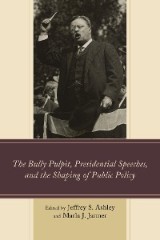Details

The Bully Pulpit, Presidential Speeches, and the Shaping of Public Policy
|
44,99 € |
|
| Verlag: | Lexington Books |
| Format: | EPUB |
| Veröffentl.: | 11.11.2015 |
| ISBN/EAN: | 9781498501965 |
| Sprache: | englisch |
| Anzahl Seiten: | 280 |
DRM-geschütztes eBook, Sie benötigen z.B. Adobe Digital Editions und eine Adobe ID zum Lesen.
Beschreibungen
<span><span>Issue framing is the way that people, especially politicians, get other people to view a particular problem or issue. By framing the issue in a particular way, the goal is to get people to think about the issue, to believe that an action is required and, most importantly, to believe that a particular action (the one being proposed by the framer) is the right one. The use of language and imagery is an essential part of issue framing and has been an integral part of the presidency since our nation’s founding, but it has become particularly important since Theodore Roosevelt began to take his message directly to the people. </span></span>
<br>
<br>
<span><span>This work examines a selected speech delivered by every president from Roosevelt through Barack Obama to show how language has been instrumental in directing policy. Each chapter will examine the situation or background for the problem, include a transcript of the speech the president delivered, and conclude with an analysis of the speech in terms of the particular frame that the speech utilized and the eventual outcome, or policy direction, inspired by the speech. </span></span>
<br>
<br>
<span><span>This work examines a selected speech delivered by every president from Roosevelt through Barack Obama to show how language has been instrumental in directing policy. Each chapter will examine the situation or background for the problem, include a transcript of the speech the president delivered, and conclude with an analysis of the speech in terms of the particular frame that the speech utilized and the eventual outcome, or policy direction, inspired by the speech. </span></span>
<span>This book explores how presidents use speeches to shape and influence public policy. Each chapter examines a selected speech delivered by every president from Roosevelt through Barack Obama to show how language has been instrumental in directing policy.</span>
<span><span>Chapter One: Theodore Roosevelt: Conservationism</span></span>
<br>
<span><span>Melinda A. Mueller</span></span>
<br>
<span><span>Chapter Two: William Howard Taft and the Conservation of the Republican Party in 1912</span></span>
<br>
<span><span>Eric Morris</span></span>
<br>
<span><span>Chapter Three: Woodrow Wilson: Women’s Suffrage</span></span>
<br>
<span><span>Marla Jarmer</span></span>
<br>
<span><span>Chapter Four: Warren G. Harding: Return to Normalcy</span></span>
<br>
<span><span>David H. Carwell</span></span>
<br>
<span><span>Chapter Five: Calvin Coolidge: Regime Articulation through Expectations</span></span>
<br>
<span><span>Joshua M. Scacco</span></span>
<br>
<span><span>Chapter Six: Herbert Clark Hoover: Farm Relief</span></span>
<br>
<span><span>Stephen F. Robar</span></span>
<br>
<span><span>Chapter 7: Franklin D. Roosevelt and the Inauguration of the New Deal</span></span>
<br>
<span><span>Richard G. Frederick</span></span>
<br>
<span><span>Chapter Eight: Harry S. Truman: Veto of Taft-Hartley Act</span></span>
<br>
<span><span>Michael Shirley</span></span>
<br>
<span><span>Chapter 9: Dwight Eisenhower: Farewell Address</span></span>
<br>
<span><span>Paul Franz Testa</span></span>
<br>
<span><span>Chapter 10: John F. Kennedy: Civil Rights</span></span>
<br>
<span><span>Marita Gronnvoll</span></span>
<br>
<span><span>Chapter 11: Lyndon Baines Johnson: Vietnam, and “Peace Without Conquest”</span></span>
<br>
<span><span>Edmund Wehrle</span></span>
<br>
<span><span>Chapter 12: Richard Nixon and American Indian Policy</span></span>
<br>
<span><span>Jeffrey S. Ashley</span></span>
<br>
<span><span>Chapter 13: Gerald Ford: Plan to Whip Inflation Now</span></span>
<br>
<span><span>Jason Edwards</span></span>
<br>
<span><span>Chapter 14: Jimmy Carter: Human Rights as “The Soul of Our Foreign Policy”</span></span>
<br>
<span><span>Teresa Maria Linda Scholz</span></span>
<br>
<span><span>Chapter 15: Ronald Reagan and American Drug Policy</span></span>
<br>
<span><span>Emily Schnurr</span></span>
<br>
<span><span>Chapter 16: George H. W. Bush and the Persian Gulf War</span></span>
<br>
<span><span>Elizabeth A. Dudash-Buskirk and Nicholas J. Nickols</span></span>
<br>
<span><span>Chapter 17: Bill Clinton: Race and the Crisis of the American Spirit</span></span>
<br>
<span><span>Kevin R. Anderson</span></span>
<br>
<span><span>Chapter 18: George W. Bush: Terrorism and American Security</span></span>
<br>
<span><span>Daneryl May Nier-Weber</span></span>
<br>
<span><span>Chapter 19: President Barack Obama: The Matthew Shepard and James Byrd Jr. Hate Crimes Prevention Act</span></span>
<br>
<span><span>Grant Walsh-Haines</span></span>
<br>
<span><span>Melinda A. Mueller</span></span>
<br>
<span><span>Chapter Two: William Howard Taft and the Conservation of the Republican Party in 1912</span></span>
<br>
<span><span>Eric Morris</span></span>
<br>
<span><span>Chapter Three: Woodrow Wilson: Women’s Suffrage</span></span>
<br>
<span><span>Marla Jarmer</span></span>
<br>
<span><span>Chapter Four: Warren G. Harding: Return to Normalcy</span></span>
<br>
<span><span>David H. Carwell</span></span>
<br>
<span><span>Chapter Five: Calvin Coolidge: Regime Articulation through Expectations</span></span>
<br>
<span><span>Joshua M. Scacco</span></span>
<br>
<span><span>Chapter Six: Herbert Clark Hoover: Farm Relief</span></span>
<br>
<span><span>Stephen F. Robar</span></span>
<br>
<span><span>Chapter 7: Franklin D. Roosevelt and the Inauguration of the New Deal</span></span>
<br>
<span><span>Richard G. Frederick</span></span>
<br>
<span><span>Chapter Eight: Harry S. Truman: Veto of Taft-Hartley Act</span></span>
<br>
<span><span>Michael Shirley</span></span>
<br>
<span><span>Chapter 9: Dwight Eisenhower: Farewell Address</span></span>
<br>
<span><span>Paul Franz Testa</span></span>
<br>
<span><span>Chapter 10: John F. Kennedy: Civil Rights</span></span>
<br>
<span><span>Marita Gronnvoll</span></span>
<br>
<span><span>Chapter 11: Lyndon Baines Johnson: Vietnam, and “Peace Without Conquest”</span></span>
<br>
<span><span>Edmund Wehrle</span></span>
<br>
<span><span>Chapter 12: Richard Nixon and American Indian Policy</span></span>
<br>
<span><span>Jeffrey S. Ashley</span></span>
<br>
<span><span>Chapter 13: Gerald Ford: Plan to Whip Inflation Now</span></span>
<br>
<span><span>Jason Edwards</span></span>
<br>
<span><span>Chapter 14: Jimmy Carter: Human Rights as “The Soul of Our Foreign Policy”</span></span>
<br>
<span><span>Teresa Maria Linda Scholz</span></span>
<br>
<span><span>Chapter 15: Ronald Reagan and American Drug Policy</span></span>
<br>
<span><span>Emily Schnurr</span></span>
<br>
<span><span>Chapter 16: George H. W. Bush and the Persian Gulf War</span></span>
<br>
<span><span>Elizabeth A. Dudash-Buskirk and Nicholas J. Nickols</span></span>
<br>
<span><span>Chapter 17: Bill Clinton: Race and the Crisis of the American Spirit</span></span>
<br>
<span><span>Kevin R. Anderson</span></span>
<br>
<span><span>Chapter 18: George W. Bush: Terrorism and American Security</span></span>
<br>
<span><span>Daneryl May Nier-Weber</span></span>
<br>
<span><span>Chapter 19: President Barack Obama: The Matthew Shepard and James Byrd Jr. Hate Crimes Prevention Act</span></span>
<br>
<span><span>Grant Walsh-Haines</span></span>
<span><span>Jeffrey S. Ashley</span><span> is a professor of political science at Eastern Illinois University.<br></span></span>
<br>
<span><span>Marla J. Jarmer</span><span> is communications instructor and director of the writing center at Danville Area Community College. </span></span>
<br>
<span><span>Marla J. Jarmer</span><span> is communications instructor and director of the writing center at Danville Area Community College. </span></span>

















